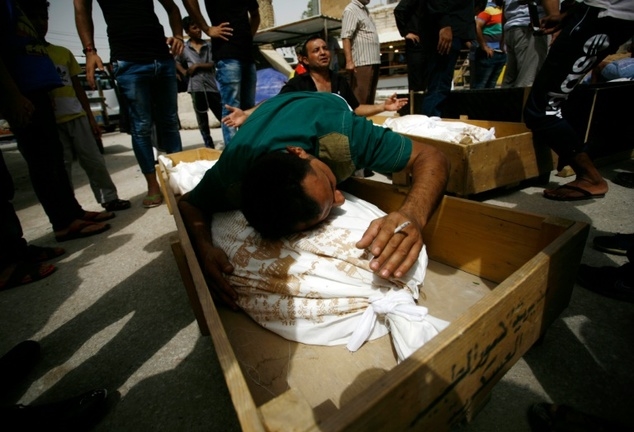 World
World

Iraq begins three days of national mourning on Monday for almost 120 people killed by a suicide bombing in a busy Baghdad shopping district claimed by Islamic State jihadists, the deadliest attack in the capital this year.
 |
| Iraqi men mourn over bodies after they lost five members of their family in a suicide bombing that ripped through Baghdad’s busy shopping district of Karrada, during a funeral Najaf, on Sunday. — AFP/VNA Photo |
The blast hit the Karrada district early on Sunday as the area was packed with shoppers ahead of this week’s holiday marking the end of the Muslim fasting month of Ramadan.
Prime Minister Haider al-Abadi announced three days of national mourning for the victims as he visited the site of the attack, and his office said he had vowed to "punish" the perpetrators.
He also ordered changes to
The attack came a week after Iraqi security forces recaptured Fallujah from IS, leaving
The blast set buildings ablaze, and crowds of people watched from the rubble-filled street as emergency personnel carried out victims and worked on the site.
A member of the civil defence forces said it would take "a number of days" to recover the bodies of the victims.
Hussein Ali, a 24-year-old former soldier, said six workers at his family’s shop were killed, their bodies so badly burned they could not be identified.
"I will return to the battlefront. At least there, I know the enemy so I can fight him. But here, I don’t know who I’m fighting," Ali said.
’Cowardly and heinous act’
IS issued a statement claiming responsibility for the suicide bombing, saying it was carried out by an Iraqi as part of "ongoing security operations".
The jihadist group said the blast targeted
UN Iraq envoy Jan Kubis condemned the "cowardly and heinous act of unparalleled proportions," calling on authorities to bring those responsible to justice.
Officials said another explosion in the Shaab area of northern
Bombings in the capital have decreased since IS overran large areas north and west of
But the group has struck back against Iraqi civilians after suffering military setbacks, and in May,
A video posted on social media showed men -- apparently angry at the government’s failure to prevent the carnage in Karrada -- throwing rocks at what was said to be Abadi’s convoy.
But the premier struck a conciliatory tone over anger directed towards him.
"I understand the emotional feelings and actions that occurred in a moment of sadness and anger," Abadi said in a statement.
With thousands of vehicles moving in and out of the city each day, such bombings are difficult to prevent.
But there are also flaws in security measures in the city, especially the continued use of fake bomb detectors at checkpoints years after the man who sold them to
Abadi announced a series of changes to security measures following the Sunday bombing, including scrapping the fake detectors.
He also ordered the deployment of scanning devices at entrances to




